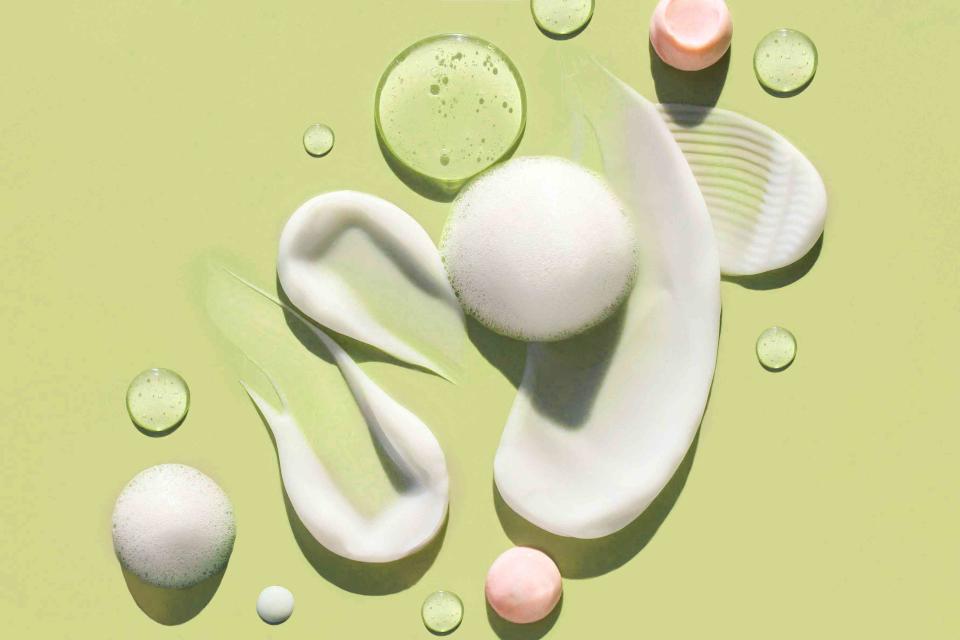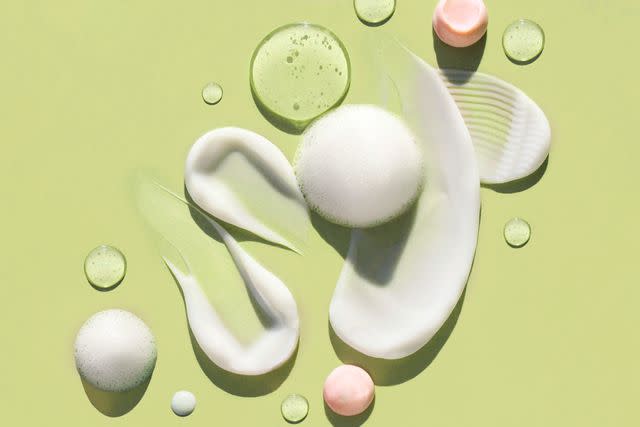7 Non-Negotiable Skin Care Products in an Anti-Aging Routine, According to Derms
Dermatologists personally use these anti-aging skincare products.

Ekaterina Klishevnik/Getty Images
Fact checked by Haley Mades
The secret to gorgeous looking skin over the long term actually consists of three parts: using science-backed ingredients, slathering high-quality products, and remaining consistent in your regimen. In doing all of the above, you’ll protect your skin from UV and free radical damage, slow down the clock, and help reverse or minimize existing signs of aging, which include fine lines, wrinkles, dark spots, and skin laxity.
Your everyday routine should include washing your face morning and night with a gentle cleanser, moisturizing, and daily SPF. Beyond that, you can incorporate additional anti-aging ingredients and products that keep your skin flawless. We asked dermatologists to share the non-negotiable anti-aging products they personally recommend, so take your cue from them.
RELATED: When Should You Start Using Anti-Aging Products? We Asked Experts

Ekaterina Klishevnik/Getty Images
Sunscreen
Ask any dermatologist which ingredient they’ll never leave the house without, and we guarantee it’ll be sunscreen.
“Sun damage is cumulative, and the easiest way to protect your skin is to use sunscreen with at least SPF 30 daily,” says Corey L. Hartman, MD, a board-certified dermatologist in Birmingham, Ala. “The more frequently skin is exposed to the sun without sun protection, the more likely your skin will prematurely age, which means sun spots and age spots, wrinkles and fine lines.”
More importantly, SPF protects you from developing skin cancer, which is the most prevalent form of cancer in the world. Dr. Hartman says to look for a broad spectrum SPF 30 sunscreen and actually take the time to reapply every two hours if you are outside or sitting near a window.
Product Pick: Isdin Eryfotona Actinica Ultralight Emulsion Broad Spectrum SPF 50+ ($60; Amazon). “I like this sunscreen a lot and have used it personally,” says Dr. Hartman. He notes that it’s a lightweight, moisturizing SPF that’s formulated with mineral zinc oxide that still won’t leave a white cast. The physical formula makes it particularly suitable for those with sensitive skin.
Vitamin C
Antioxidants are essential in any anti-aging skincare routine. Kseniya Kobets, MD, a board-certified cosmetic dermatologist, says her favorite antioxidant is vitamin C, also known as L-ascorbic acid.
“If you want to prevent aging, stimulate collagen, and brighten the skin, then vitamin C should be part of your daily regimen,” she notes. “Our skin cells are exposed to DNA damage from the outside with UV light, blue light, and infrared radiation, as well as outside pollution and chemicals, internal metabolism, stress. Vitamin C is a known potent antioxidant to fight this free radical damage, while at the same time building collagen and [brightening] the skin.”
Product Pick: Skinbetter Alto Advanced Defense and Repair Serum ($190; Skinbetter). “This is a powerful antioxidant serum that not only has a vitamin C ester derivative (tetrahexyldecyl ascorbate), but various other antioxidants to boost free radical fighting,” says Dr. Kobets. “It's also fragrance free and paraben free and will not clog your pores.”
Hyaluronic Acid
Hydration is essential for every skincare routine, and especially one that prioritizes anti-aging. It’s a humectant, which means it attracts moisture to your skin to help hydrate skin cells and plump them up. In turn, skin looks fuller, plumper, and more radiant.
“I recommend implementing hyaluronic acid into your routine as early as possible,” says Jeanette Graf, MD, a board-certified dermatologist and the assistant clinical professor of dermatology at Mt Sinai School of Medicine. “Skin of all ages needs to be hydrated, especially if using drying ingredients like chemical exfoliants or retinol. A healthy skin moisture barrier is crucial to overall skin health.”
Product Pick: SkinCeuticals Hyaluronic Acid Intensifier ($110; Dermstore). Dr. Graf says, “I recommend using this serum daily—morning or night. It should be applied after your toner and before your moisturizer and sunscreen.”
Peptides
Peptides are tiny chains of proteins that help repair damaged skin cells. They can also boost your body's natural levels of collagen, which ultimately helps slow signs of aging.
“Peptides are unique in that they help boost collagen and elastin production in the skin,” says Roberta Del Campo, MD, a board-certified cosmetic dermatologist at Del Campo Dermatology & Laser Institute. “They improve skin quality by firming and strengthening the skin.”
Product Pick: Doctor Babor Power Serum Ampoule ($55; Babor). “These provide the perfect amount for use on both your face and neck,” says Dr. Del Campo. “They’re formulated with three EGF and FGF peptides, as well as hyaluronic acid.”
Ceramides
Along with drawing moisture to your skin, you want to make sure you lock it in. Ceramides do an excellent job with this, which is why they’re a non-negotiable anti-aging product that dermatologists recommend.
“Ceramides are an ingredient in many moisturizers because they help seal in moisture. Also, ceramides in skin care mimic the natural skin barrier because we have ceramides in our skin,” explains Elizabeth Hale, MD, a board-certified dermatologist based in New York City.
Product Pick: SkinMedica TNS Ceramide Treatment Cream ($72; Dermstore). Dr. Hale says, “I like to apply a product with ceramides at nighttime over a retinol product, or one with retinol properties so that the skin can heal and repair itself overnight.”
Retinoids
A derivative of vitamin A, retinoids are an essential ingredient in anti-aging routines. And you’d be hard-pressed to find a dermatologist who doesn’t have at least one or two high-quality retinoids sitting on their bathroom shelf.
Dr. Hartman explains that retinoids help generate skin cell turnover, which in turn helps smooth the appearance of fine lines and wrinkles while evening out your complexion. It’s also renowned for its ability to target acne. He adds, “The benefits are numerous and unparalleled and are arguably the most important step that you can take for overall skin health and anti-aging after SPF.”
He recommends starting with an over-the-counter retinol with a concentration of .25% or .5%, and notes that anything less than .25% won’t be effective. If you’ve never used a retinol before, start by using this once or twice a week at night right before your moisturizer, then build up to daily use. As your skin adapts, you can ask your dermatologist for a more potent prescription retinoid.
Product Pick: Skinbetter Alpharet Clearing Serum ($135; Skinbetter). “This formula pairs retinol with salicylic acid to help with the skin’s overall appearance, and it doesn’t dry out the skin,” says Dr. Hartman.
Bakuchiol
As incredible as retinoids are, this ingredient may not be suitable for people with sensitive skin. It’s also not recommended when pregnant or breastfeeding.
“Bakuchiol is a great retinol alternative because some people’s skin can’t tolerate prescription retinoids,” notes Dr. Hale. “Bakuchiol has retinol properties, but is not irritating. It helps with cell turnover and keeps your skin healthy, while evening out skin tone and pigmentation.”
She adds that those with even sensitive skin—including people with eczema and rosacea—should be able to tolerate this ingredient every night. Start slowly with a once or twice-weekly application, then slowly build up to nightly usage.
Product Pick: Isdin Melatonik Lightweight Night Serum with Bakuchiol ($165; Dermstore). “This formula provides an effective alternative to prescription retinoids that works well for sensitive skin,” Dr. Hale says.
For more Real Simple news, make sure to sign up for our newsletter!
Read the original article on Real Simple.

